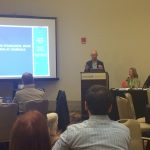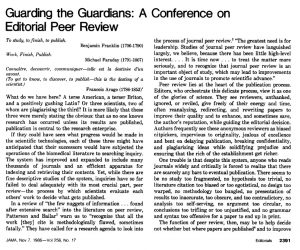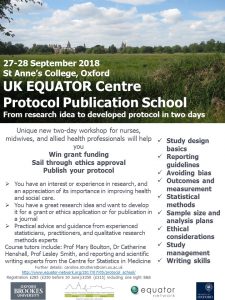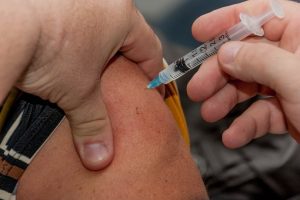Join the UK EQUATOR Centre’s monthly one-hour practical and interactive workshops on all aspects of writing and publishing your academic research.
Workshops are held 12:30-13:30 in the Botnar Research Centre‘s main seminar room.
The workshop series is free for University of Oxford and Oxford Brookes staff and students, but registration is required. For notification of booking opening and announcement of other EQUATOR courses in Oxford, please join our mailing list by sending a blank email to equator-oxford-subscribe@maillist.ox.ac.uk.
For more information and to enquire about UK EQUATOR Centre training for your department or group, please email Caroline Struthers (caroline.struthers@csm.ox.ac.uk).
Upcoming sessions
10 Jan 2019
Zero to hero: writing a bio – book now
Jen de Beyer
Create the perfect professional biography for your website, then convert it into a short conference bio.
2018 sessions
Fri 26 Jan 2018
Perfecting your elevator pitch – download worksheet (Word)
Jen de Beyer
Whether standing by your conference poster, at a professional networking event, or in the pub, the question is the same: “So, what is it that you do?” With that crucial two-minute elevator pitch answer ready, you’ll never say “ummmm” again!
Friday 23 February
Planning for publication – download worksheet (Word)
Jen de Beyer
What do you and your co-authors need to decide before you start to write? Get your message, audience, and target journal sorted now to ensure a smooth publication process!
Wed 28 March
Critical appraisal and peer review
Gary Collins
This session leads you step by step through conducting and writing up a peer review report.
19 April 2018
Avoiding authorship angst
Jen de Beyer
Learn about the rules for authorship and practice negotiating authorship rights and responsibilities.
17 May 2018
Writing your first draft
Jen de Beyer
Once you’ve planned your publication, you’re ready to use reporting guidelines to write your first draft. We’ll cover the structure of a journal article, what info goes where, and common pitfalls to avoid in each article section.
14-15 June 2018
EQUATOR Publication School
The secrets of success in writing and publishing your research article.
4 July 2018
Reporting your statistical analyses – download slides (PDF)
Michael Schlussel
This workshop includes practical tips and tricks for making sure your paper makes a stats reviewer’s heart sing, and not sink!
30 Aug 2018
Writing an abstract
Jen de Beyer
An article abstract needs to be an accurate well-structured summary and entice your readers to read further. As many readers only have access to the abstract, and it is often used by journal editors and scientific committees to decide whether to send the article for peer review, you need to get it spot on.
5 Sept 2018
Top titles & killer key words
Jen de Beyer
Your article title is the first – and possibly only – thing that most people will read. A great title grabs your readers’ attention and gives them the full picture about your article. Bring along your latest project to practice writing declarative, descriptive, and question titles. We also talk about keywords, so often relegated to the last 5 minutes before submission
18 Oct 2018
Editing your own words
Jen de Beyer
Great writing is simple, clear, and complete. You’ll practice balancing these three elements in group editing exercises.
21 November 2018
Communications and social media
Jo Silva
Extend the life and reach of your article after publication by working with your communications team and engaging with potential readers through social media.
6 December 2018
Responding to peer reviewers comments
Michael Schlussel
Practice dealing with the kind, the fair, and the seriously challenging.


 The Introduction to Medical Research: Essential Skills course provides an overview of key steps and common methods in medical research and its publication.
The Introduction to Medical Research: Essential Skills course provides an overview of key steps and common methods in medical research and its publication. I recently attended the 8th Congress on Peer Review in Chicago (10-12 September 2017). Unusually this event takes place only every 4 years, so this was the 8th such Congress in a series starting in 1989. I’m one of very few people who have attended all 8 congresses (and no, I don’t know the difference between a congress and a conference).
I recently attended the 8th Congress on Peer Review in Chicago (10-12 September 2017). Unusually this event takes place only every 4 years, so this was the 8th such Congress in a series starting in 1989. I’m one of very few people who have attended all 8 congresses (and no, I don’t know the difference between a congress and a conference). The EQUATOR team were invited to present a satellite workshop on Saturday 9th. We rose to the challenge and decided to tackle the topic of what journals can do to implement reporting guidelines. The rather ambitious idea was to produce a one-page “Action Plan” for journals and publishers to kick-start activities to embed reporting guidelines more effectively. Read
The EQUATOR team were invited to present a satellite workshop on Saturday 9th. We rose to the challenge and decided to tackle the topic of what journals can do to implement reporting guidelines. The rather ambitious idea was to produce a one-page “Action Plan” for journals and publishers to kick-start activities to embed reporting guidelines more effectively. Read  From the beginning the force behind the PRCs has been Drummond Rennie. With the support of JAMA and the AMA he published an advance notice nearly three years before the first meeting highlighting the lack of evidence behind editorial policies and peer review in particular. He urged people to conduct research to present at the meeting. Fifty abstracts were submitted in 1989, with a steady increase over time to 260 in 2017. This year’s congress was the biggest so far with about 600 delegates.
From the beginning the force behind the PRCs has been Drummond Rennie. With the support of JAMA and the AMA he published an advance notice nearly three years before the first meeting highlighting the lack of evidence behind editorial policies and peer review in particular. He urged people to conduct research to present at the meeting. Fifty abstracts were submitted in 1989, with a steady increase over time to 260 in 2017. This year’s congress was the biggest so far with about 600 delegates. Turn your research question into a perfect protocol in just two days!
Turn your research question into a perfect protocol in just two days! The WHO Initiative for Vaccine Research is developing a statement on improving availability and transparency of observational studies on influenza vaccine effectiveness. WHO calls on all interested persons to provide comments on the
The WHO Initiative for Vaccine Research is developing a statement on improving availability and transparency of observational studies on influenza vaccine effectiveness. WHO calls on all interested persons to provide comments on the 
 We are proud and delighted to announce that on 23 May 2017, Iveta Simera accepted the
We are proud and delighted to announce that on 23 May 2017, Iveta Simera accepted the